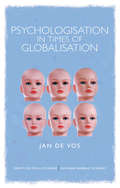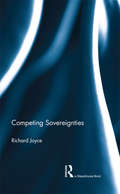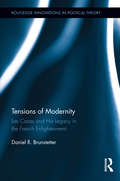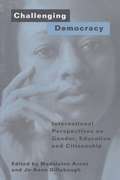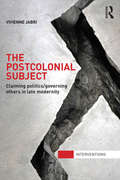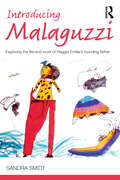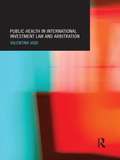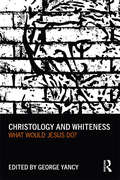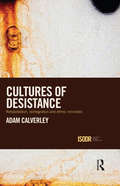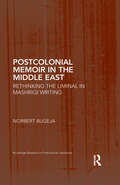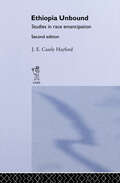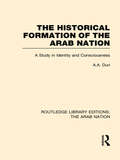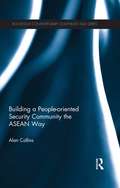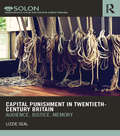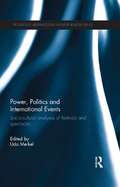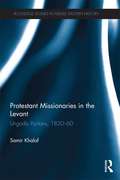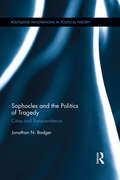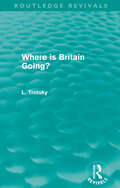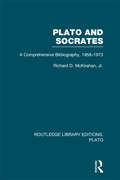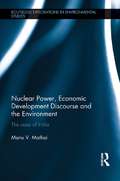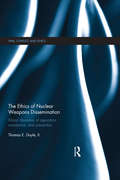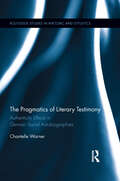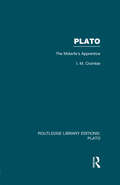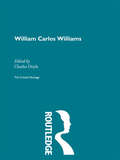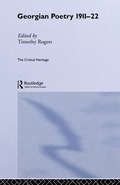Special Collections
Benetech’s Global Certified Accessible Titles
Description: Benetech’s GCA program is the first independent third-party EPUB certification to verify ebook accessibility. By creating content that is born accessible, publishers can meet the needs of all readers. Learn more: https://bornaccessible.benetech.org/
- Table View
- List View
Psychologisation in Times of Globalisation
by Jan De VosToday more than ever, our understanding of ourselves, others and the world around us is described in psychological terms. Psychologists deeply influence our society, and psychological-discourse has invaded companies, advertising, culture, politics, and even our social and family life. Moreover, psychologisation has become a global process, applied to situations such as torture, reality TV and famine. This book analyses this ‘overflow of psychology’ in the three main areas of science, culture and politics. The concept of psychologisation has become crucial to current debates in critical psychology. De Vos combines these debates with insights from the fields of critical theory, philosophy and ideology critique, to present the first book-length argument that seriously considers the concept of psychologisation in these times of globalisation. The book contains numerous real-world examples making it an accessible and engaging analysis that should be of interest to researchers, postgraduates and undergraduate students of psychology and philosophy.
Competing Sovereignties
by Richard JoyceCompeting Sovereignties provides a critique of the concept of sovereignty in modernity in light of claims to determine the content of law at the international, national and local levels. In an argument that is illustrated through an analysis of debates over the control of intellectual property law in India, Richard Joyce considers how economic globalization and the claims of indigenous communities do not just challenge national sovereignty - as if national sovereignty is the only kind of sovereignty - but in fact invite us to challenge our conception of what sovereignty ‘is’. Combining theoretical research and reflection with an analysis of the legal, institutional and political context in which sovereignties 'compete', the book offers a reconception of modern sovereignty - and, with it, a new appreciation of the complex issues surrounding the relationship between international organisations, nation states and local and indigenous communities.
Tensions of Modernity
by Daniel R. BrunstetterPolitics today is marked by tension between claims of universal human rights and diversity. From the war on terror to immigration, one of the major challenges facing liberalism is to understand the scope of equality in a world in which certain peoples are perceived to reject and/or violently resist democratic principles. This book revisits Europe’s initial encounter with the Native Americans of the New World to shed light on how the West’s initial defense of so-called ‘barbarians’ has influenced the way we think about diversity today, and elucidate the arguments of exclusion that unconsciously permeate the moral world we live in. In doing so, Daniel R. Brunstetter traces Bartolomé de Las Casas’s oft heralded defense of the Native Americans in the sixteenth century through the French Enlightenment. While this defense has been rightly lauded as an early example of human rights discourse, tracing Las Casas’s arguments into the eighteenth century shows how his view of equality enabled arguments legitimizing the annihilation by ‘just’ war of those perceived to be ‘barbarians’. This philosophical narrative can be useful when thinking about concepts such as just war, multiculturalism, and immigration, or any area in which politics confronts radical difference.
Challenging Democracy
by Madeleine Arnot and Jo-Anne DillaboughThis collection establishes a highly topical, new, international field of study: that of gender, education and citizenship. It brings together for the first time important cutting-edge research on the contribution of the educational system to the formation of male and female citizens. It shows how gender relations operate behind apparently neutral concepts of liberal democratic citizenship and citizenship education.The editors asked leading international educationalists to describe the theoretical frameworks and methodologies they used to research gender and citizenship.Challenging Democracy suggests ways in which the educational system could help develop genuinely inclusive democratic societies in which men and women play an equal role in shaping the meaning of citizenship.
The Postcolonial Subject
by Vivienne JabriThis book places the lens on postcolonial agency and resistance in a social and geopolitical context that has witnessed great transformations in international politics. What does postcolonial politics mean in a late modern context of interventions that seek to govern postcolonial populations? Drawing on historic and contemporary articulations of agency and resistance and highlighting voices from the postcolonial world, the book explores the transition from colonial modernity to the late modern postcolonial era. It shows that at each moment wherein the claim to politics is made, the postcolonial subject comes face to face with global operations of power that seek to control and govern. As seen in the Middle East and elsewhere, these operations have variously drawn on war, policing, as well as pedagogical practices geared at governing the political aspirations of target societies. The book provides a conceptualisation of postcolonial political subjectivity, discusses moments of its emergence, and exposes the security agendas that seek to govern it. Engaging with political thought, from Hannah Arendt, to Frantz Fanon, Michel Foucault, and Edward Said, among other critical and postcolonial theorists, and drawing on art, literature, and film from the postcolonial world, this work will be of great interest to students and scholars of critical international relations, postcolonial theory, and political theory.
Introducing Malaguzzi
by Sandra SmidtLoris Malaguzzi is recognised as the founder of the extraordinary programmes of preschool education that developed after the war in Reggio Emilia, Italy. Deeply embedded in the cultures and communities they serve, these unique preschools have justifiably become famous throughout the world. In this accessible and engaging text, Sandra Smidt examines how Malaguzzi’s philosophy developed out of his personal experiences of growing up in post-fascist Italy. His ideas are explored and illustrated throughout by examples relating to everyday early years practice. The key themes explored include: relationships — the importance of relationships, culture and contexts to learning within any setting and beyond; transparency — the importance of listening and documentation to understanding and sharing learning; questioning — inviting children to not only answer questions but raise them, allowing them to be equal partners in all learning situations; creativity — finding ways of enabling children to use all the expressive languages they can find to express and share their ideas; equity and fairness — involving the community in all decision-making and discussions, to ensure that early childhood education is accessible and relevant to all children.? This book will be of benefit to all those working with young children and essential reading for students on early childhood education programmes.
Public Health in International Investment Law and Arbitration
by Valentina VadiIs a State free to adopt measures to protect the public health of its citizens? If so, what are the limits, if any, to such regulatory powers? This book addresses these questions by focusing on the clash between the regulatory autonomy of the state and international investment governance. As a wide variety of state regulations allegedly aimed at protecting public health may interfere with foreign investments, a tension exists between the public health policies of the host state and investment treaty provisions. Under most investment treaties, States have waived their sovereign immunity, and have agreed to give arbitrators a comprehensive jurisdiction over what are essentially regulatory disputes. Some scholars and practitioners have expressed concern regarding the magnitude of decision-making power allocated to investment treaty tribunals. This book contributes to the current understanding of international investment law and arbitration, addressing the fundamental question of whether public health has and/or should have any relevance in contemporary international investment law and policy. With a focus on the ‘clash of cultures’ between international investment law and public health, the author critically analyses the emerging case law of investment treaty arbitration and considers the theoretical interplay between public health and investor rights in international investment law. The book also explores the interplay between investment law and public health in practice, focusing on specific sectors such as pharmaceutical patents, tobacco regulation and environmental health. It then goes on to analyze the available means for promoting consideration of public health in international investment law and suggests new methods and approaches to better reconcile public health and investor rights.
Christology and Whiteness
by George YancyThis book explores Christology through the lens of whiteness, addressing whiteness as a site of privilege and power within the specific context of Christology. It asks whether or not Jesus’ life and work offers theological, religious and ethical resources that can address the question of contemporary forms of white privilege. The text seeks to encourage ways of thinking about whiteness theologically through the mission of Jesus. In this sense, white Christians are encouraged to reflect on how their whiteness is a site of tension in relation to their theological and religious framework. A distinguished team of contributors explore key topics including the Christology of domination, different images of Jesus and the question of identification with Jesus, and the Black Jesus in the inner city.
Cultures of Desistance
by Adam CalverleyIn contrast to the widespread focus on ethnicity in relation to engagement in offending, the question of whether or not processes associated with desistance – that is the cessation and curtailment of offending behaviour – vary by ethnicity has received less attention. This is despite known ethnic differences in factors identified as affecting disengagement from offending, such as employment, place of residence, religious affiliation and family structure, providing good reasons for believing differences would exist. This book seeks to address this oversight. Using data obtained from in-depth qualitative interviews it investigates the processes associated with desistance from crime among offenders drawn from some of the principal minority ethnic groups in the United Kingdom. Cultures of Desistance explores how structural (families, friends, peer groups, employment, social capital) and cultural (religion, values, recognition) ethnic differences affected the environment in which their desistance took place. For Indians and Bangladeshis, desistance was characterised as a collective experience involving their families actively intervening in their lives. In contrast, Black and dual heritage offenders’ desistance was a much more individualistic endeavour. The book suggests a need for a research agenda and justice policy that are sensitive to desisters’ structural location, and for a wider culture which promotes and supports desisters’ efforts.
Postcolonial Memoir in the Middle East
by Norbert BugejaThis book reconsiders the notion of liminality in postcolonial critical discourse today. By visiting Mashriqi writers of memoir, Bugeja offers a unique intervention in the understanding of 'in-between' and ‘threshold’ states in present-day postcolonialist thought. His analysis situates liminal space as a fraught form of consciousness that mediates between conditions of historical contingency and the memorializing present. Within the present Mashriqi memoir form, liminal spaces may be read as articulations of 'representational spaces' — narrative spaces that, based as they are within the histories of local communities, are nonetheless redolent with memorial and imaginary elements. Liminal consciousness today, Bugeja argues, is a direct consequence of the impact of volatile present-day memories on the re-conception of the open wounds of history. Incisive readings of life-writings by Mourid Barghouti, Amin Maalouf, Orhan Pamuk, Amos Oz, and Wadad Makdisi Cortas demonstrate the double-edged representational chasm that opens up when present acts of memorializing are brought to bear upon the elusive histories of the early-twentieth-century Mashriq. Sifting through the wide-ranging theoretical literature on liminality and challenging received views of the concept, this book proposes a nuanced, materialist, and original rethinking of the liminal as a more vigilant outlook onto the political, literary and historical predicaments of the contemporary Middle East.
Ethiopia Unbound
by J.E.Caseley HayfordFirst published in 1969. Routledge is an imprint of Taylor & Francis, an informa company.
The Historical Formation of the Arab Nation
by A A DuriThis book is a comprehensive examination of the historical process of social formation that gave rise to the communal consciousness of the Arab nation and determined its sense of identity. It aims to provide a historical context for the assessment of prevailing concepts and suggests hypotheses for the development of modern Arab consciousness. The book firstly traces Arab origins and the formation of Arab societies after the emergence of Islam, assessing the perspectives and factors that shaped the rise of the Arab nation in both practical and intellectual terms. It then examines the beginning of the Arab awakening and the course of its development in the latter half of the nineteenth century and the first two decades of the twentieth, focusing on the emergence of a nationalist perspective in the development of intellectual positions on patriotism and Arabism.
Building a People-Oriented Security Community the ASEAN way
by Alan CollinsASEAN has declared its intention to create a security community in Southeast Asia that is people-orientated. This book evaluates ASEAN’s progress, and in doing so examines three matters of concern. The book firstly looks at the importance of constitutive norms to the workings of security communities, by identifying ASEAN’s constitutive norms and the extent to which they act as a help of hindrance in establishing a security community. It then moves on to how ASEAN has interpreted people-orientated as empowering civil society organisations to be community stakeholders. The book discusses the uncertainty between how ASEAN envisages their role, and the role they themselves expect to have. Civil society actors are seeking to influence what sort of community evolves and their ability to interact with the state elite is evaluated to determine what interpretation of people-oriented is likely to emerge. Thirdly, in order to make progress ASEAN has sought to achieve cooperation among its member states in functional areas. The book examines this interest in functional cooperation through case studies on human rights, HIV/AIDS and disaster management. By discussing the notion of ASEAN being people-orientated, and how it engages with ‘the people’, the book provides important insights into what type of community ASEAN in building, as well as furthering our understanding on security communities more broadly.
Capital Punishment in Twentieth-Century Britain
by Lizzie SealCapital punishment for murder was abolished in Britain in 1965. At this time, the way people in Britain perceived and understood the death penalty had changed – it was an issue that had become increasingly controversial, high-profile and fraught with emotion. In order to understand why this was, it is necessary to examine how ordinary people learned about and experienced capital punishment. Drawing on primary research, this book explores the cultural life of the death penalty in Britain in the twentieth century, including an exploration of the role of the popular press and a discussion of portrayals of the death penalty in plays, novels and films. Popular protest against capital punishment and public responses to and understandings of capital cases are also discussed, particularly in relation to conceptualisations of justice. Miscarriages of justice were significant to capital punishment’s increasingly fraught nature in the mid twentieth-century and the book analyses the unsettling power of two such high profile miscarriages of justice. The final chapters consider the continuing relevance of capital punishment in Britain after abolition, including its symbolism and how people negotiate memories of the death penalty. Capital Punishment in Twentieth-Century Britain is groundbreaking in its attention to the death penalty and the effect it had on everyday life and it is the only text on this era to place public and popular discourses about, and reactions to, capital punishment at the centre of the analysis. Interdisciplinary in focus and methodology, it will appeal to historians, criminologists, sociologists and socio-legal scholars.
Power, Politics and International Events.
by Udo MerkelAlthough the event management field has grown considerably over the last decade, critical, social-scientific studies of the international events industry are rare. This book intends to help fill this void. It focuses on power, social and political relations, conflicts and controversies in the context of international events, popular festivals and famous spectacles. It draws on recent primary research and offers a diverse range of new and intriguing case studies, for example the Arirang Festival in North Korea, the Gay Games, the Gymnaestrada, horse-racing events, the London 2012 Olympics, regional and rural festivals, the World Baseball Classic, World Fairs/Expos and U2 concerts. The main aim of this volume is to bring the critical, social-scientific analysis of events, festivals and spectacles more into the core of the teaching of events management degree programmes. The book draws extensively upon the disciplines of politics, sociology, cultural studies and history.In the process, it addresses key themes such as: • political economy• politics of popular culture• the global and the local• regionalism and globalization• nations and nationalism• international relations and foreign policy. This groundbreaking collection of essays is unique and innovative. It will be an essential source for students, researchers and academics with a keen interest in critical, social-scientific analyses of events.
Protestant Missionaries in the Levant
by Samir KhalafThrough focusing on the unintended by-products of New England Puritanism as a cultural transplant in the Levant, this book explores the socio-historical forces which account for the failure of early envoys’ attempts to convert the ‘native,’ population. Early failure in conversion led to later success in reinventing themselves as agents of secular and liberal education, welfare, and popular culture. Through making special efforts not to debase local culture, the missionaries’ work resulted in large sections of society becoming protestantized without being evangelized. An invaluable resource for postgraduates and those undertaking postdoctoral research, this book explores a seminal but overlooked interlude in the encounters between American Protestantism and the Levant. Using data from previously unexplored personal narrative accounts, Khalaf dates the emergence of the puritanical imagination, sparked by sentiments of American exceptionalism, voluntarism and "soft power" to at least a century before commonly assumed.
Sophocles and the Politics of Tragedy
by Jonathan N. BadgerSophocles and the Politics of Tragedy is an inquiry into a fundamental political problem made visible through the tragic poetry of Sophocles. In part I Badger offers a detailed exegesis of three plays: Ajax, Antigone, and Philoctetes. These plays share a common theme, illuminating a persistent feature of political life, namely the antagonism between the heroic commitment to the beautiful and the transcendent on the one hand, and the community’s need for bodily safety and material security on the other. This conceptual structure not only helps us understand these plays but also establishes a distinctive vision of the tragic dimension of political life—a vision that can be applied fruitfully to examinations of political projects quite distant from the world of fifth-century Athens. Such an application is the aim of part II, in which Badger coordinates the results of the inquiries of part I and applies them to a consideration of the competing claims of three strands of medieval and early modern political philosophy: ecclesiastical rule, scientific domination, and liberal government. Badger identifies the last of these—early modern liberalism—as a "tragic politics" that seeks to sustain and contain the tension between transcendent longing and material need.
Where is Britain Going?
by Leon TrotskyFirst Published in 1926, Where is Britain Going? focuses on the historical factors and circumstances which were to define Britain’s development in the midst of social unrest at that time. The book considers the future of Britain in an age when the working classes were being driven into confrontation with the state under the impact of the world crisis of capitalism. Writing over eighty years ago, Trotsky concentrates on the decline of British imperialism in his analysis of the Bolshevik Revolution. In a brilliant polemic that exposes all the treachery of the Labour leaders in the year before the General strike, he recalls the revolutionary traditions of the working class and draws on the historical lessons of the English Civil War and Chartism. Rejecting the parliamentary road and stripping bare the pretensions of Fabian socialism, Where is Britain going? outlines perspectives of revolution which continue to retain their validity.
Plato and Socrates
by Richard McKirahanThis valuable work of reference provides a comprehensive bibliography on all scholarly work that was published on Plato and Socrates during the years 1958-73. It thus forms an important addition to Harold Cherniss’s bibliography, which covered the years 1950-7. The author has sought to include all materials primarily concerned with Socrates and Plato, together with other works which make a contribution to our understanding of the two philosophers. The bibliography is arranged by topic and there are cross-references at the end of each section. The works in each category are arranged chronologically and then alphabetically (by author) within each year. An effort has been made to distinguish when a book has had more than one edition and when an article has been reprinted. Additionally the author has listed reviews of books and dissertations as these have come to his attention.
Nuclear Power, Economic Development Discourse and the Environment
by Manu V. MathaiNuclear power is often characterized as a "green technology." Technologies are rarely, if ever, socially isolated artefacts. Instead, they materially represent an embodiment of values and priorities. Nuclear power is no different. It is a product of a particular political economy and the question is whether that political economy can helpfully engage with the challenge of addressing the environmental crisis on a finite, inequitable and shared planet. For developing countries like India, who are presently making infrastructure investments which will have long legacies, it is imperative that these investments wrestle with such questions and prove themselves capable of sufficiency, greater equality and inclusiveness. This book offers a critique of civilian nuclear power as a green energy strategy for India and develops and proposes an alternative "synergy for sustainability." It situates nuclear power as a socio-technical infrastructure embodying a particular development discourse and practice of energy and economic development. The book reveals the political economy of this arrangement and examines the latter’s ability to respond to the environmental crisis. Manu V. Mathai argues that the existing overwhelmingly growth-focused, highly technology-centric approach for organizing economic activity is unsustainable and needs to be reformed. Within this imperative for change, nuclear power in India is found to be and is characterized as an "authoritarian technology." Based on this political economy critique the book proposes an alternative, a synergy of ideas from the fields of development economics, energy planning and science, technology and society studies.
The Ethics of Nuclear Weapons Dissemination
by Thomas E. Doyle, IIThis book examines the moral dilemmas of nuclear dissemination, and the justifications of both nuclear pursuit and avoidance by contemporary states. Applying Constructivist methodologies and moral theory, the author analyses a core set of moral dilemmas that ensnare decision-makers amongst state and non-state nuclear aspirants, as well as amongst states committed to preventing horizontal proliferation. The book shows that the character, structure and implications of these dilemmas have not yet been adequately understood or appreciated, and that such an understanding is necessary for an effective set of nonproliferation policies. Furthermore, it shows that the dilemmas’ force and political policy import are evident in the 'discourses' that diverse actors undertake to defend their nuclear choices, and how the dilemmas of nuclear aspirants are implicated in those of nuclear preventers. The author advocates a number of policy recommendations that reinforce some already made by scholars and experts but, more importantly, others that advise significantly different courses of action. The book reveals how the moral dilemmas of nuclear aspiration, avoidance, and prevention constitute the security dilemmas and paradoxes that comprise much of the 21st century security environment. This book will be of much interest to students of nuclear proliferation, international relations, ethics, and international security studies.
The Pragmatics of Literary Testimony
by Chantelle WarnerIn this book, Warner examines a number of German-language literary autobiographies that are connected to diverse social movements of the last forty years. These books have all received critical attention from the popular press, topped bestseller lists, and have been pivotal in discussions of authenticity, subjectivity, and referentiality. Because of the thematic diversity of these works, scholars within literary and cultural studies have tended to treat them separately under topical categories, such as women’s literature, the post-war generation, migration and multiculturalism, etc. Underlying Warner’s analysis is the belief that the social construction of autobiographical acts is as much a matter of textuality as it is of topicality i.e., how language means, rather than what it means, and that a pragmatic-stylistic approach is well-suited to describing how literary autobiographies come to function as testimonies to certain collective experiences. By presenting a model for an integrative stylistics approach, The Prgamatics of Literary Testimony participates in current discussions within fields of literary linguistic scholarship, as well as autobiographical theory. In its analysis of key examples of German social testimonies from the late twentieth century, this book incorporates insights from discourse analysis, pragmatics, cogntive poetics, and sociolinguistics in order to demonstrate that this diverse body of works constitutes a particular form of textual practice defined by what the author calls authenticity effects—feelings of realism, immediacy, exemplarity, genuineness, and social relevance. Such a study of authenticity as a poetic effect, can help us to better understand the testimonial glamour owned by various types of autobiographical narration.
Plato
by I M CrombieIn Plato’s Theaetetus, Socrates is portrayed as a midwife to the intellect, a metaphor for his task as a dialectician as he seeks to help give birth to wisdom. Thus it is that the author refers to Plato as the midwife’s apprentice. This volume represents an attempt to provide a more manageable account of the author’s two volume magnum opus, An Examination of Plato’s Doctrines. An accessible and lucid introduction to Plato’s ideas is provided which nonetheless challenges traditional interpretations. In particular the author is concerned to offer an interpretation of the significance of what Plato said. The chapters are arranged by topic, for ease of comprehension.
William Carlos Williams
by Charles DoyleThis set comprises of 40 volumes covering nineteenth and twentieth century European and American authors. These volumes will be available as a complete set, mini boxed sets (by theme) or as individual volumes. This second set compliments the first 68 volume set of Critical Heritage published by Routledge in October 1995.
Georgian Poetry 1911-22
by Timothy RogersThis set comprises 40 volumes covering 19th and 20th century European and American authors. These volumes will be available as a complete set, mini boxed sets (by theme) or as individual volumes. This second set complements the first 68 volume set of Critical Heritage published by Routledge in October 1995.
